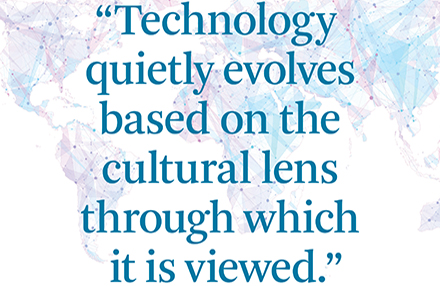Magazine: Winter 2019 | Volume 26, No. 2

Unlike the human fingerprint, which is immutable and unique to each individual, technology has a print that does not hold constant. It continually evolves based on the culture and context of its application. The application of technology can reflect the ethos of its users in the context that it is situated. In this winter issue, we showcase the unique appropriation of technology by computer scientists, academics, and engineers within different cultural contexts. Our goal is to give credence to the unique influence of cultural perspectives on technology use. This collection of articles is an invitation for XRDS readers to take a critical glance at the everyday experiences that exist around us all.
Download
- Digital Edition web-based magazine available for subscribers – sign in
- PDF via ACM’s Digital Library
COLUMN: Careers
Tightening a few loose bolts on the career ship
By Chittaranjan Tripathy, Yannis Pavlidis
SECTION: Features
Decolonizing design through the perspectives of cosmological others: Arguing for an ontological turn in design research and practice
A closer attention to cultural and cosmological difference as the basis for thinking about how we redesign our own modern technological infrastructures may be the way to decolonize design research.
By Ahmed Ansari
Havana's StreetNet: Innovation from necessity
In Havana, technology enthusiasts have designed StreetNet, a community network that serves as an alternative to the worldwide web. This article describes the deeply relational practices that go toward the maintenance of StreetNet, highlighting elements of struggle that accompany innovative strategies that result from necessity.
By Michaelanne Dye
The past and present: A push toward the good life
In this article, we contemplate how African communities, based on their unique experiences and backgrounds, can increasingly become producers and participants in the technology development process; a step beyond just being end-users.
By Cynthia Habonimana, Moses Namara
Finding the local in locations: Working with GPS non-use in Nairobi
The Nairobi Accident Map crowdsourced traffic accident reports on social media and geocoded them using the landmarks and road names mentioned in social media posts. In doing so, the project centered the agency and local practices of Kenyan social media users.
By Elizabeth Resor
How technology converses with local languages
The relationship between technology and language use is situated in social and historical factors. Considering the meaning of language use in technology design is essential for supporting diverse language preferences.
By Naveena Karusala
Protibadi: Starting the fight against sexual abuse
The story of how a group of Bangladeshi volunteers used technology to address the country's sexual abuse problem.
By Nova Ahmed
Africa's social contract with AI
The ethics of artificial intelligence in Africa should come from the social contract theories and ethical frameworks developed by African philosophers. But if AI researchers fail to incorporate cultural differences, they risk perpetuating the same injustices witnessed during colonial times.
By Ezinne Nwankwo, Belona Sonna
Artificial intelligence policies in Africa over the next five years
As Africa embraces and interacts with AI, what policies are relevant to foster its development? This article highlights some domains where AI is being applied and will be beneficial given Africa's unique context and culture.
By Micheal Nayebare
Cyber security in Africa: The boring technology story that matters
Cybersecurity involves protection of computer systems from theft, damage, or manipulation to the hardware, software, or the data contained on them. A limitless cyberspace, little to no boundaries, and eroding national borders is making Africa vulnerable to cyber threats and potential harms. Cybersecurity represents serious economic and national security challenges, which need to be properly defined and contextualized.
By Hood Mukiibi
The one about resilience, energy, culture, and crafting
Joreen Arigye, a data analyst at Fenix International, shares her perspective on the importance of culture in the workplace. Having grown up directly connected to the typical Fenix customer, she has the ability to contribute knowledgeably to validating results from models, analysis, recommendations, and intervention strategies.
By Lynn Kirabo
SECTION: Profile
Alex Pehler and Microsoft TEALS
Teachers of high school computer programming
By Bryan Knowles
DEPARTMENT: Labz
Limitless computing
Quantum Information Center, the University of Texas at Austin
By Sepideh Maleki
DEPARTMENT: Hello world
Using Grover's search quantum algorithm to solve Boolean satisfiability problems, part 2
By Diogo Fernandes, Carla Silva, Inês Dutra






















